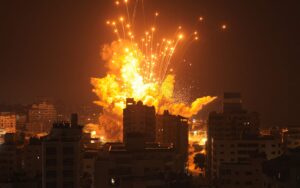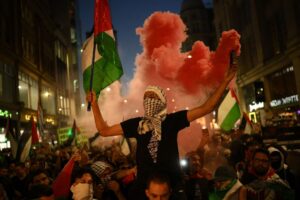My father had told me, the night before, that he wanted to go to the synagogue, because of the festival, that it would be a happy time to be in the sanctuary. And so that morning, we went, knowing something bad was happening in Israel, but not exactly what.
On the Sabbath, we are supposed to rest, and we did not have our phones. But when we got there, the dark faces were not those of a holiday, and we started to suspect that, somehow, things had got a lot worse.
“Have you seen what’s happening?” someone said. There were dozens dead, maybe more. And they were still dying.
We blessed the Torah. Like always, we read from it. And we said a prayer to remember my grandmother. And then, at the time it always is, it was the time for the sermon.
“For those of you that don’t already know,” said the Rabbi. “Israel is under attack. There are over a hundred dead.”
At that moment, a thought came, like a scream from somewhere inside me. A sharp stab.
How many times have I sat here, in the midst of our songs, of our togetherness, and heard them announce something similar? How many times have I heard the Rabbi say those words, “Our brothers and sisters have been killed”? In terror attacks in Israel, in America, in France, in Germany, in Tunisia — it goes on. It goes on too long.
I tried to remember, as the Rabbi was speaking, but I lost count. It seemed like only yesterday that the Rabbi said a prayer for Pittsburgh, 11 dead, a blessing for the Hypercacher, five dead. Because, really, it was only yesterday. The Rabbi was still speaking, but I could no longer hear him.
My wife and I are expecting a child in January. And so frightened am I, that he may not be born; that if we dare to settle on a name, as our hardwired old superstitions go, the Angel of Death may find him. I hadn’t wanted, or really I hadn’t dared, to imagine what the whole course of his life might look like.
And at that moment I did.
All my life, I have wanted a Jewish child. All my life, I have felt it my highest calling. My ultimate purpose. That I should pass this on. But in that moment, full of the fear of fatherhood, in the confusion and pain and elation of letting go of an old life, there was now something else: the knowledge that he could be killed as a Jew. That the thing I had most wanted for him, or needed from him — to be Jewish — could hurt him, harm him, could even kill him. Like the dead babies I didn’t yet know about.
The Rabbi switched for a short moment to a verse in Hebrew. And my eyes drifted to the corner where my grandmother used to sit on holidays. She’s been dead for almost 13 years but I always see her there. She was a Holocaust survivor. And I remember when I used to think pogroms belonged to her world. Not to mine.
Ever since we first started praying for “our brothers and sisters” killed in France, not just in the Middle East, and certainly since we started doing it for those in America, the knowledge it could happen anywhere has, attack after attack, woven itself into our lives as Jews. It’s always there. In the back of my mind. That the places we pray, or the places we go, are the places where something could happen. I remember thinking pogroms could never happen inside Israel. I remember last week.
Sitting there, I realised it’s not my own enormous failings, or worries about money, or all the usual stuff that frightens me about being a father. It’s also the knowledge that I am bringing a Jewish soul into a world where not even the greatness of America, the principles of Europe or the soldiers of Israel can make this promise: that your children will not be killed as Jews.
“This time,” said the Rabbi, “is set aside for our rejoicing, as it is written in our Torah. These festivals are for our happiness, even now at the time of our sadness. And so let it still be there, even today. Let it be a sad happiness… that we are together, that we are still here… and that we are Israel.”
I know this pattern almost by heart. The prayers we say after the sermon. The songs when I know it’s almost done. And then, like any other time, we left the sanctuary to say the blessing over snacks. It’s a particular kind of recognition you have with the people you pray with. You might never have more than nodded at them. But their faces are part of the furniture of your life.
None of us had our phones, at least openly. None of us knew that more than 1,200 Israelis were dead or about to die. This was the crescendo of the worst massacre of our kind since the Holocaust — but we smiled, said a few how-are-yous and ate the cookies. None of us knew how many people we would be texting to see if they were safe, in our own families, among our relatives, or our friends. We didn’t know that what was happening, right then, at the festival, in the kibbutzim, would chase us, in some way or another, for the rest of our lives. We only knew we were there together. In that sad happiness — that we were Jews.
Disclaimer
Some of the posts we share are controversial and we do not necessarily agree with them in the whole extend. Sometimes we agree with the content or part of it but we do not agree with the narration or language. Nevertheless we find them somehow interesting, valuable and/or informative or we share them, because we strongly believe in freedom of speech, free press and journalism. We strongly encourage you to have a critical approach to all the content, do your own research and analysis to build your own opinion.
We would be glad to have your feedback.
Source: UnHerd Read the original article here: https://unherd.com/




